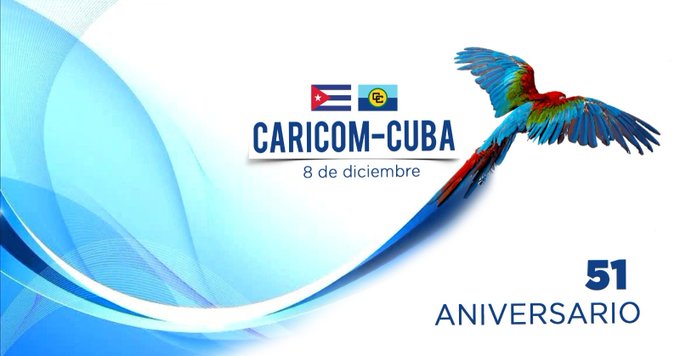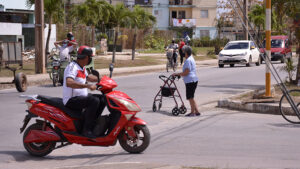In a year marked by the 51st anniversary of their bilateral ties, the Caribbean Community (Caricom) once again accompanied Cuba in the international arena, especially to demand an end to the blockade imposed by the United States.
Cuban President Miguel Díaz-Canel highlighted the deep ties of friendship and cooperation between his country and those of the Caribbean, on the occasion of Caricom-Cuba Day, celebrated in recognition of the establishment of diplomatic relations between Cuba and Barbados, Guyana, Jamaica and Trinidad and Tobago.
«We remember that courageous decision, in a hostile context of attempted diplomatic isolation imposed by the United States on Cuba,» the president said in his account on the social network X, noting that it opened the way for Havana’s ties with the rest of the nations of the regional organization.
During these five decades, the island nation has granted scholarships, technical aid and assistance in situations of natural disasters, while a large number of its health collaborators have provided services in the bloc made up of more than 10 territories and nations.
These are Antigua and Barbuda, Bahamas, Barbados, Belize, Belize, Dominica, Grenada, Guyana, Haiti, Jamaica, Montserrat, St. Lucia, St. Kitts and Nevis, St. Vincent and the Grenadines, Suriname and Trinidad and Tobago; while Anguilla, Bermuda, Cayman Islands, Turks and Caicos Islands and British Virgin Islands are associate members.
One of the most significant demonstrations of Cuba’s solidarity with the region was the deployment of more than 1,200 doctors in Haiti to fight the cholera epidemic that hit that Antillean nation in 2010, resulting in thousands of deaths and infections.
Cooperation is also recognized by the authorities of both parties in other areas such as education and agriculture.
Meanwhile, the integration mechanism founded in 1973 demands in all international forums the immediate end of the economic, commercial and financial blockade maintained by Washington for more than half a century, and which on November 2 was once again categorically rejected by 187 nations of the world.
During the two days of debates in the United Nations General Assembly on a draft resolution to put an end to the blockade, those nations and regional organizations ratified their position against that policy, considered the greatest obstacle to the development of the country.
The U.S. blockade against Cuba «leaves aside the principles of multilateralism» and is a clear violation of the letter and spirit of the Charter of the world organization, said the representative of Saint Lucia, Menissa Ramballi, speaking on behalf of Caricom.
«There can be no exceptions to international law,» she stressed, denouncing this unilateral and clearly extraterritorial encirclement, which is maintained despite multiple resolutions approved over the years within the organization and in other scenarios.
It constitutes «an obstacle for trade between that country and Caricom», and also for regional cooperation, added Ramballi, also supporting the previous declarations of the Non-Aligned Movement, the Group of 77 and China, and the Community of Latin American and Caribbean States (CELAC).
In the same space and on behalf of Celac, the representative of Saint Vincent and the Grenadines, Inga Rhonda King, reiterated her firm and unequivocal rejection of the application of measures and laws contrary to international law, such as the Helms-Burton Act, including the extraterritorial effects and the increasing persecution of the island’s financial transactions.
We also oppose, he said, the unjust inclusion of Cuba in the list of State sponsors of terrorism drawn up by Washington, because besides lacking substance and substance, it has increased the consequences of the blockade and worsened the country’s possibilities of establishing financial and trade relations with its partners.
The diplomat urged the U.S. government to comply with the numerous resolutions of the General Assembly and to act in response to the repeated calls of the international community by putting an end to that policy, while expressing the extreme concern of CELAC in view of the growing impact of the siege on the island.
According to official data, the damages caused by these measures between March 1, 2022 and February 28, 2023 total four thousand 867 million dollars, which reflects the worsening of Cuban exports, mainly in the tourism sector.
Likewise, in the opinion of the authorities, the ruthless persecution of the country’s banking-financial operations, the costs of geographic relocation of trade, the effects on production and services to the population, as well as the impediments to access advanced technologies.
In total, the economic damages based on current prices amount to 159,84.3 billion dollars, and to more than one trillion 337,000, taking into account the behavior of the dollar against the value of gold on the international market.
The losses exceed 405 million dollars per month, which is equivalent to one million dollars every two hours.
On December 8, the First Deputy Minister of Cuba, Inés María Chapman, ratified on Caricom-Cuba Day her country’s gratitude to the Caribbean nations for their determination to maintain stable and broad relations with the island and for their support in condemning the blockade imposed by the United States.




